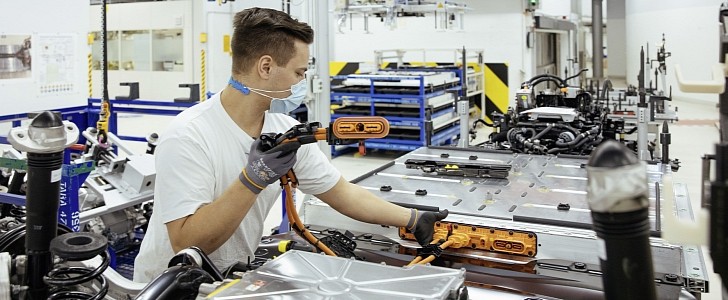Whenever an industry faces a revolution, old jobs disappear to create new ones. The automotive industry is being warned about that for more than a decade. However, it seems it is starting to believe that just now. For those that still doubt such effects, CLEPA disclosed that the electric mobility transition may kill more than 500,000 jobs in Europe alone until 2035.
The European Association of Automotive Suppliers asked PwC Strategy& for an idea of the impact of phasing out combustion engines until 2035. The consulting company analyzed three scenarios: one with mixed technologies, the EV-only approach proposed by the “Fit for 55” package, and an extreme EV ramp-up situation. The “Fit for 55” package is a set of proposals to revise and update EU legislation for the European Union to achieve a 55% reduction in carbon emissions by 2030.
In all three scenarios, the market share of electric cars would reach respectively more than 50%, above 80%, or close to 100% by 2030. Starting with the EV-only approach, PwC calculated that 501,000 jobs would become obsolete.
If the European Union started making batteries, the region could get 226,000 new jobs. However, that would still imply that 275,000 work positions would be lost for good until 2040. CLEPA reminds us that this battery production capability is not sure and that it would require new players, meaning that the current suppliers that did not manage to make anything useful for electric cars would probably go bust.
To avoid that, CLEPA suggests that the European Union should adopt a mixed technology approach with renewable fuels. If that happened, the association claims that Europe would save up to 50% in carbon emissions by 2030 without losing so many jobs in the process.
If the plans remain as they currently are, CLEPA believes that more than 70% of these 501,000 jobs (359,000, to be precise) will disappear in a matter of five years: from 2030 until 2035.
Although using renewable fuels would have seemed ok a few years ago, the problem now is if car buyers would be willing to wait. Who will risk buying a car powered by fuel when they know these vehicles are doomed by legislation and bans? Electric cars are the safe bet and the only ones most people may consider buying some years from now.
Unless these buyers are those afraid to lose their jobs, the CLEPA appeal will not make much difference. It may not affect even those with their jobs at stake: buying a car that is not an EV could represent a double risk.
In all three scenarios, the market share of electric cars would reach respectively more than 50%, above 80%, or close to 100% by 2030. Starting with the EV-only approach, PwC calculated that 501,000 jobs would become obsolete.
If the European Union started making batteries, the region could get 226,000 new jobs. However, that would still imply that 275,000 work positions would be lost for good until 2040. CLEPA reminds us that this battery production capability is not sure and that it would require new players, meaning that the current suppliers that did not manage to make anything useful for electric cars would probably go bust.
To avoid that, CLEPA suggests that the European Union should adopt a mixed technology approach with renewable fuels. If that happened, the association claims that Europe would save up to 50% in carbon emissions by 2030 without losing so many jobs in the process.
If the plans remain as they currently are, CLEPA believes that more than 70% of these 501,000 jobs (359,000, to be precise) will disappear in a matter of five years: from 2030 until 2035.
Although using renewable fuels would have seemed ok a few years ago, the problem now is if car buyers would be willing to wait. Who will risk buying a car powered by fuel when they know these vehicles are doomed by legislation and bans? Electric cars are the safe bet and the only ones most people may consider buying some years from now.
Unless these buyers are those afraid to lose their jobs, the CLEPA appeal will not make much difference. It may not affect even those with their jobs at stake: buying a car that is not an EV could represent a double risk.












